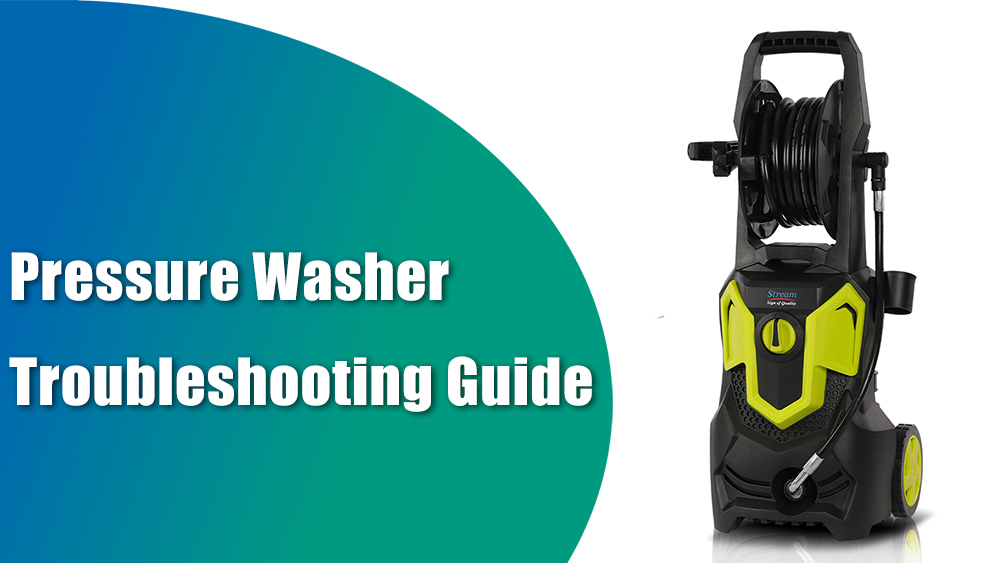+86 13816508465
Pump Troubleshooting
Jan. 19, 2025

Table of Contents
1. Leakage Issues
2. Product Not Starting or Intermittent Starting
3. Machine Continues to Run After Shutting Off the Gun
4. Intermittent Water Pressure
5. Machine Emitting Smoke During Operation
6. Non-Suction Issue
Leakage Issues
High-Pressure Hose Leakage
Joint Leaks: Inspect the O-ring at the joint; replace if damaged.
Tube Ruptures: Replace the hose if there are signs of wear or rupture due to vibration against hard surfaces.
Improved Hose: Since late September 2023, a wear-resistant high-pressure hose has been available.
Two-Way Valve Leakage
Roller Hose Reel O-ring Damage: Inspect and replace the O-ring if it's damaged or missing.
Two-Way Pressure Plate Cracks: The structure has been improved from plastic to metal to prevent cracking; inspect and replace if necessary.
Improved Two-Way Valve: Metal-structured two-way valves are available.
Inlet Leakage
Quick Connector Leaks: Ensure the quick connector is properly seated; replace if not suitable.
Seal Ring Missing or Damaged: Check the condition of the seal ring and replace if necessary.
Water Gun Plug Leakage
Leakage at Quick Connector: Inspect the O-ring at the high-pressure hose connector; replace if damaged or missing.
Internal Leakage: Check for internal leakage at the gun plug by connecting the high-pressure hose and turning on the water gun; replace if unsuitable.
Product Not Starting or Intermittent Starting
Machine Continues to Run After Shutting Off the Gun
Air or Water Leaks: Check for leaks in the water and air connections, including the integrity of O-rings.
Switch and Valve Inspection: Disassemble the casing to check for any stuck micro-switches or damaged seals in the overflow valve.
Intermittent Water Pressure
Nozzle Blockage: Check the water gun nozzle for blockages; use a steel needle to clear the nozzle or try a new nozzle.
Leakage: Inspect connections for leaks, including the water gun, high-pressure hose, and inlet hose.
Pressure Valve Failure: Disassemble the casing and check the overflow valve seal for damage or cleanliness.
Machine Emitting Smoke During Operation
Power Issues: Unstable power connections or damaged power cords can cause motor overheating and smoke emission.
Motor Inspection: After shutdown, inspect the motor for external damage (broken fan causing inadequate cooling) and internal damage (brushes, commutators, stator, rotor).
Circuit Board and Wiring: Inspect the motor wiring for damage after disassembling the casing.
Non-Suction Issue
Air or Water Leaks in Inlet Hose: Check the quick connector of the inlet hose for leaks.
Kinked Inlet Hose: Straighten the inlet hose to ensure smooth water flow.
Exceeding Suction Head: If the height difference between the water source and the machine exceeds the self-suction head (1.5m), lower the height difference.
Suggested Use Procedure
Connect the inlet hose (check for integrity), connect the power, and start the switch. Once water flows from the machine's outlet, connect the high-pressure hose and water gun, then activate the water gun. This procedure helps to quickly expel air, allowing for rapid water intake and high-pressure establishment.
Previous: None
Next: Top 5 Tips to Identify Water Pump Issues Quickly and Easily
Address
No.17 XeDa Jimei Ind. Park, Xiqing Economic Development Area, Tianjin, China
Telephone
+86 13816508465
QUICK LINKS